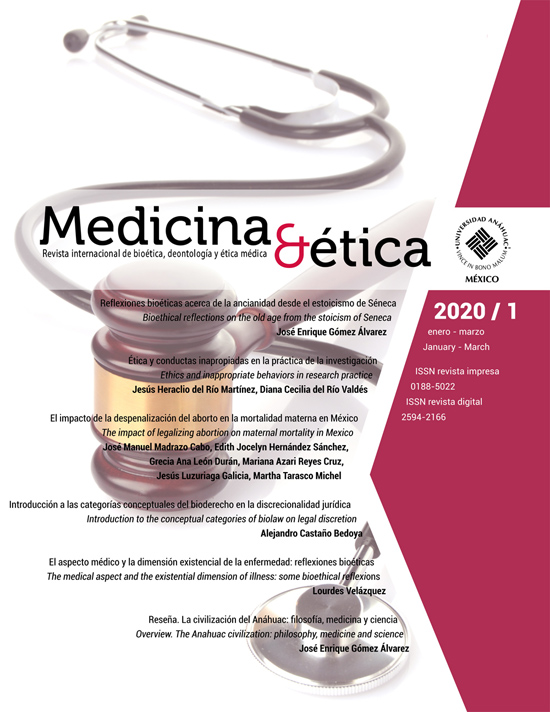Ética y conductas inapropiadas en la práctica de la investigación
Contenido principal del artículo
Resumen
Se presenta una panorámica de diferentes aspectos éticos vinculados con los procesos de investigación y de publicación académica. Se describen algunas interacciones entre los componentes del sistema de investigación, que pueden influir en conductas inapropiadas de los investigadores al realizar su trabajo y publicar sus resultados. Se destacan los principales valores y conocimientos que deben servir como marco de referencia a los investigadores para trabajar de forma honesta y hacer publicaciones balanceadas, justas y legales, dentro de un estilo académico riguroso y claro. Se destacan algunas de las principales consecuencias del fraude académico y se hace un exhorto para fomentar una cultura de buenas prácticas académicas a los estudiantes durante su formación.
Descargas
PLUMX Metrics
Detalles del artículo

Esta obra está bajo una licencia internacional Creative Commons Atribución-NoComercial-CompartirIgual 4.0.
Medicina y Ética se distribuye bajo Licencia Creative Commons Atribución-NoComercial-CompartirIgual 4.0 Internacional.
El autor conserva los derechos patrimoniales sin restricciones y garantiza a la revista el derecho de ser la primera publicación del trabajo. El autor es libre de depositar la versión publicada en cualquier otro medio, como un repositorio institucional o en su propio sitio web.
Citas
2. SILVA HERNÁNDEZ, D., LLANES CUEVAS, R., RODRÍGUEZ SILVA, A. Manifestaciones impropias en la publicación científica. CULCyT: Cultura Científica y Tecnológica. 2008; 25 (año 5): 5-15. Recuperado en: ///C:/Users/jdelrio/Downloads/Dialnet-ManifestacionesImpropiasEnLaPublicacionCientifica-2734222%20(5).pdf; https://doi.org/10.1590/s0864-34662007000400009
3. MISRA, D.P., RAVINDRAN, V., AGARWAL, V. Integrity of authorship and peer review practices: Challenges and opportunities for improvement. Journal of Korean Medical Science. 2018; 33(46): e287-e. Recuperado en: https://doi.org/10.3346/jkms.2018.33.e287.
4. BRONOWSKI, J. Los orígenes del conocimiento y la imaginación. Barcelona, Gedisa,1997.
5. WHO. Editor Big data and artifcial intelligence for achieving universal health coverage: an international consultation on ethics. Meeting report 12–13 October 2017; 2018; Miami, Florida, USA. World Health Organization Geneva.
6. ABAD-GARCÍA, M.F. El plagio y las revistas depredadoras como amenaza a la integridad científica. Anales de Pediatría. 2019; 90(1): 57 e1-e8. Recuperado en: https://doi.org/10.1016/j.anpedi.2018.11.003.
7. SALINAS, P.J. Fraude científico en el ambiente universitario. MedUla. 2004; 13: 42-7. Recuperado en: https://www.researchgate.net/profile/Pedro_Salinas/publication/28110698_
Fraude_cientifico_en_el_ambiente_universitario/links/540f4a690cf2df04e75a2c78/Fraude-cientifico-en-el-ambiente-universitario.pdf; https://doi.org/10.25267/rueda.2015.07
8. DAY, R.A., SÁENZ, M. Organización Panamericana de la Salud. Cómo escribir y publicar trabajos científicos. 3 ed. Washington D.C. Organización Panamericana de la Salud, 2005. https://doi.org/10.21149/spm.v58i5.8182
9. ORI. The Office of Research Integrity. 28 Guidelines at a glance on avoiding plagiarism. RCR Casebook: data acquisition an management [Internet]. 12 de abril de 2019. Recuperado en: https://ori.hhs.gov/plagiarism-0
10. HART, C. Doing a literature review: releasing the social science research imagination. London, Sage Publications. 1998; IX, 230 pp.
11. ORI. The Office of Research Integrity. Case Three: I really can’t acquire important data? RCR Casebook: Data acquisition an management [Internet]. 12 de abril de 2019. Recuperado en:
https://ori.hhs.gov/case-three-i-really-can’t-acquire-important-data
12. PARKER, M., KINGORI, P. Good and bad research collaborations: researchers’ views on science and ethics in global health research. Plos One. 2016; 11(10): e0163579. https://doi.org/10.1371/journal.pone.0163579
13. International Committee of Medical Journal Editors. Recommendations for the conduct, reporting, editing, and publication of scholarly work in medical journals. Diciembre de 2018, p. 19. Recuperado en: http://www.icmje.org/recommendations/ https://doi.org/10.1016/j.cnre.2016.01.001
14. REYES, B.H. Honestidad y buena fe: dos pilares en la ética de las publicaciones biomédicas. Revista Médica de Chile. 2007; 135: 415-8. Recuperado en: http://dx.doi.org/10.4067/S0034-98872007000400001
15. SOLÍS SÁNCHEZ, G., CANO GARCINUÑO, A., ANTÓN GAMERO, M., MANRIQUE DE LARA, L.A., REY GALÁN, C. Plagio y ética en las publicaciones científicas. An Pediatr (Barc). 2019; 90(1): 1-2. https://doi.org10.1016/j.anpedi.2018.10.008
16. FANELLI, D. How many scientists fabricate and falsify research? A systematic review and meta-analysis of survey data. Plos One. 2009; 4(5): e5738. Recuperado en: https://doi.org/10.1371/journal.pone.0005738.
17. BUNGE, M. El fraude científico. La Nación. 23 de octubre 2000; Sect. Opinión. Recuperado en: http://wwwlanacioncomar/38036-el-fraude-cientifico,2000.
18. RIVERA, H. Fake peer review and inappropriate authorship are real evils. Journal of Korean Medical Science. 2018; 34(2): e6-e. Recuperado en: https://doi.org/10.3346/jkms.2019.34.e6
19. SCHOFFERMAN, J, WETZEL, F.T., BONO, C. Ghost and guest authors: you can’t always trust who you read. Pain Medicine. 2015; 16(3): 416-20. Recuperado en: https://doi.org/10.1111/pme.12579
20. LO, B., WOLF, L.E., BERKELEY, A. Conflict-of-interest policies for investigators in clinical trials. New England Journal of Medicine. 2000; 343(22): 1616-20. https://doi.org/10.056/NEJM200011303432206.
21. GHOOI, R.B. Conflict of interest in clinical research. Perspectives in Clinical Research. 2015; 6(1): 10-4. DOI: 4103/2229-3485.148794.
22. FIELD, M.J., LO, B. Conflict of interest in medical research, education, and practice. Washington, DC. National Academies Press, 2009. Recuperado en: https://www.fdanews.com/ext/resources/files/archives/i/IOM090504.pdf;
23. THOMPSON, D.F. Understanding financial conflicts of interest. New England Journal of Medicine. 1993; 329: 573. Recuperado en: https://pdfs.semanticscholar.org/0795/04bd2e2161f0ae521ecdf84a46a809743051.pdf
24. EVANS, J.A., REIMER, J. Open access and global participation in science. Science. 2009; 323(5917): 1025. Recuperado en: https://www.researchgate.net/profile/James_Evans5/publication/24026922_Open_Access_and_Global_ Participation_in_Science/links/02bfe510fdf7a067bc000000.pdf; https://doi.org/10.1126/science.1154562
25. BEALL, J. Best practices for scholarly authors in the age of predatory journals. The Annals of The Royal College of Surgeons of England. 2016; 98(2): 77-9. https://doi.org/10.1308/rcsann.2016.0056

